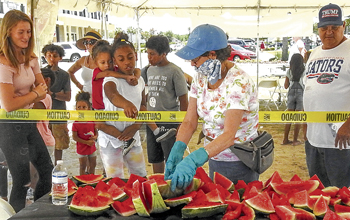NEWBERRY – For the past 74 years Newberry has hosted an event to celebrate the community’s rural history and the crop the town has become known for—watermelons. But this year, the milestone 75th Anniversary almost didn't happen due to the COVID-19 pandemic.
Due to the need for social distancing to slow the infection rate, all public events in the spring were canceled, including traditional spring festivals in many small towns.
“This was our 75th anniversary and we really wanted to celebrate that,” said vendor coordinator Christina Bridwell. “We are the longest running consecutive festival in the United States and felt that as the state was reopening that the festival would bring hope and a sense of normality to the community.”
Bridwell said they had been working on the festival for months and had the sponsors and vendors lined up before the stay at home orders. “However, we also wanted to be safe and follow the guidelines, Bridwell added. “We tried to be cognizant of social distancing and sanitation though as well, so even though much of the work had already been done, it was not until May 20 that we made the final decision to go ahead with it,” Bridwell said.
This year, festival coordinators spaced vendors farther apart than in the past and put hand washing stations throughout the event as well as hand sanitizer and also recommended that attendees wear masks.
Bridwell said, “We want to make this is a successful event to show we can have festivals safely. There are other festivals and events sponsors that are looking at us to see how this goes. We really wanted to keep the tradition going.”
The Newbery Watermelon Festival has a rich history that started in 1946 at the end of World War II. It was not only a celebration of the town’s livelihood, but also a festival to bring happiness and normalcy back at the end of a tumultuous time. Seventy-five years later the world is facing another crisis and the festival committee felt there was again a need to bring the community together,
Newberry began as a mining town in the 1880s after phosphate was discovered in the western part of Alachua County. In 1893, the Savannah, Florida and Western Railway was extended south from High Springs to Newberry, providing transportation for the mines and leading to its formation as a railroad town and trading center. By 1896 there were 14 mines operating nearby. Newberry grew quickly, with hotels, boarding houses, and saloons to accommodate the often transient workforce. But the demand for phosphate ended abruptly in 1914 when war was declared against Germany who was the principal customer for Newberry's phosphate.
The remaining community had to find a new way to produce income and the local economy turned from phosphate production to agriculture and new commodity crops. It was particularly successful in producing watermelons and Newberry became well known for their watermelons. In 1946, the year after the end of World War II, a committee of local citizens decided to hold a festival celebrating watermelon production and the Newberry Watermelon Festival was born. Until this year, the event has been held annually on the third Saturday in May.
The festival is organized and produced by a committee of local residents with the support of the city and business sponsors. The event is produced with a large group of volunteers, including Police Explorers who help manage traffic and parking. Sponsors provided donations either as cash or in-kind products. The festival also gets additional funds by charging for parking. Some of the money raised is used to fund three $1,000 scholarships for Newberry High School seniors to cover tuition and books to attend Santa Fe College. Any additional money goes to the schools for supplies and to the Red Cross for any local need that arises.
The festival also hosts several special events and contests celebrating the rural history of the town, such as hog calling, watermelon seed spitting and watermelon rolling contests. A separate area is set up for a kids playground featuring bounce houses and a miniature train ride with the cars pulled by a tractor. The festival is meant to be a family event with various activities for a younger audience, including The Rage, a mobile Laser Tag game with different sections and objectives similar to a video game set up.
On the opposite side of the event was Mister Crabs Entertainment Center. Referred to as “edutainment,” the booths featured various educational material on butterflies, hermit crabs and other sea creatures. They also offered hermit crab adoptions, crab races and a butterfly tent where kids could feed the butterflies. Other vendors served a variety of food or sold products and crafts. Some vendors offered services or public information and being an election year, several candidates also hosted vendor tents.
But one of the big draws is always the free watermelon slices to cool down on a hot day. The servers, all wearing masks and gloves for everyone's safety, handed out slices to a seemingly never-ending line of eager customers. The melons are donated each year by local farmers; this year it was by Frey Farms. Any watermelons still available after 2 p.m. could be purchased with the remainder donated to local food banks and churches. Although the festival closed at 4 p.m., the celebration continued with live music from the Ronny McKinnley band from 6-10 p.m. While the event was smaller than in years past, it still went on and was well attended. Similar to its roots in 1946, the festival again brought enjoyment and a sense of normalcy during challenging times.
# # #
Email rcarson@
alachuatoday.com
Watermelon, Watermelon, Watermelon: Newberry Watermelon Festival Celebrates 75 Years
Tools
Typography
- Font Size
- Default
- Reading Mode


